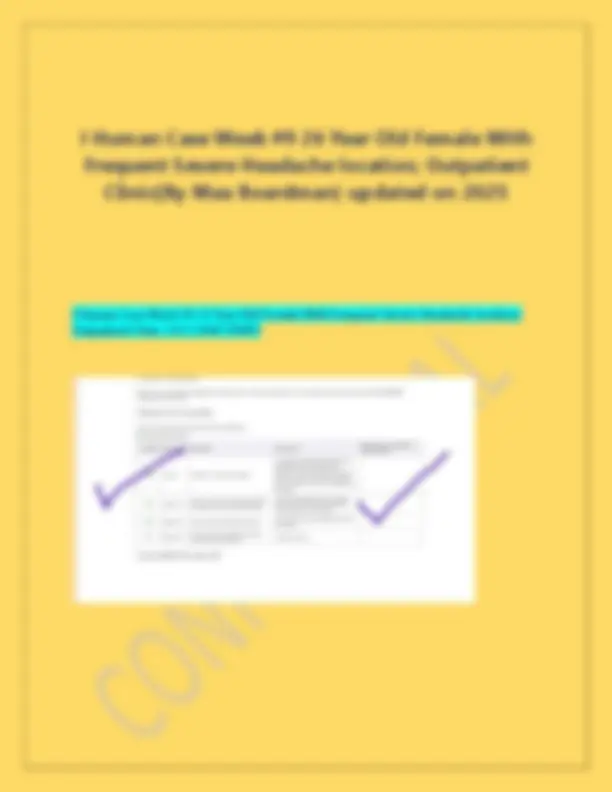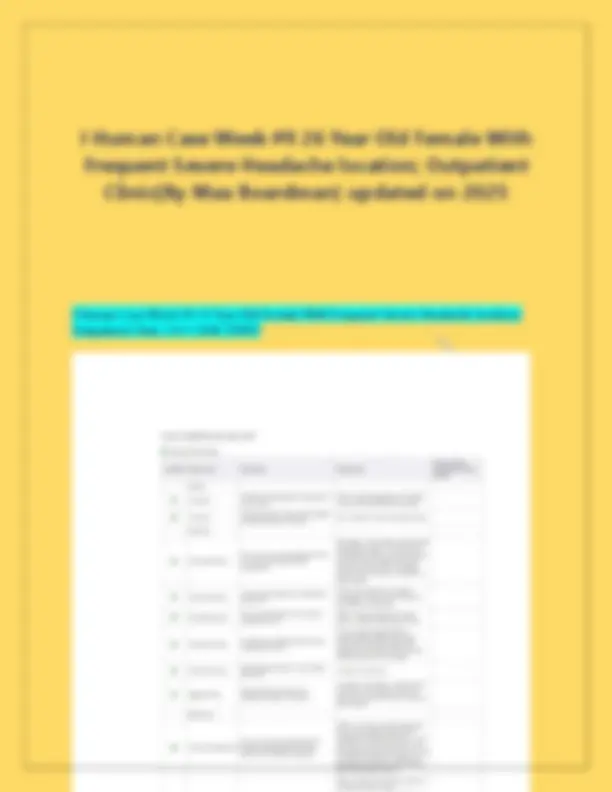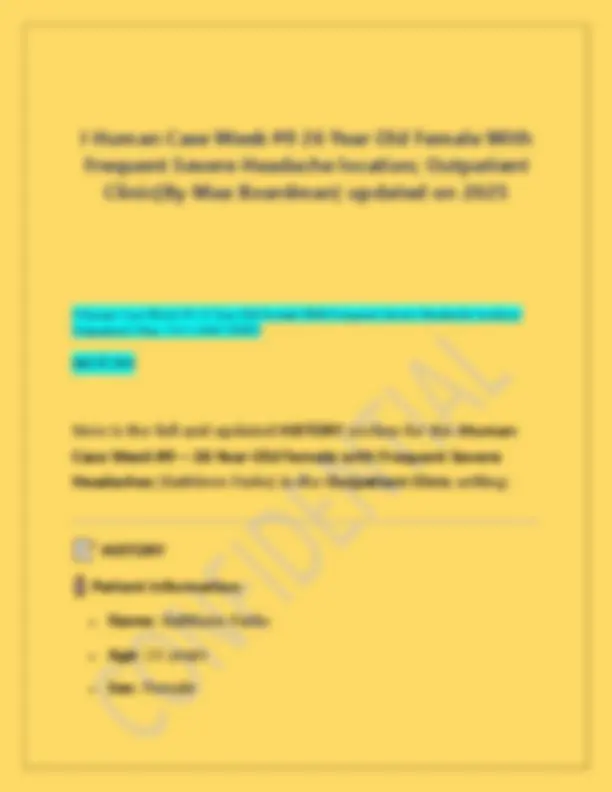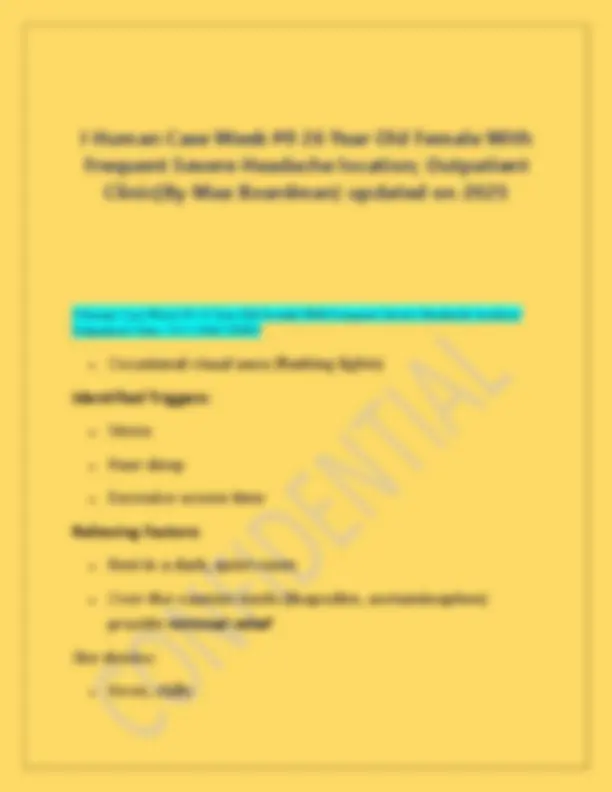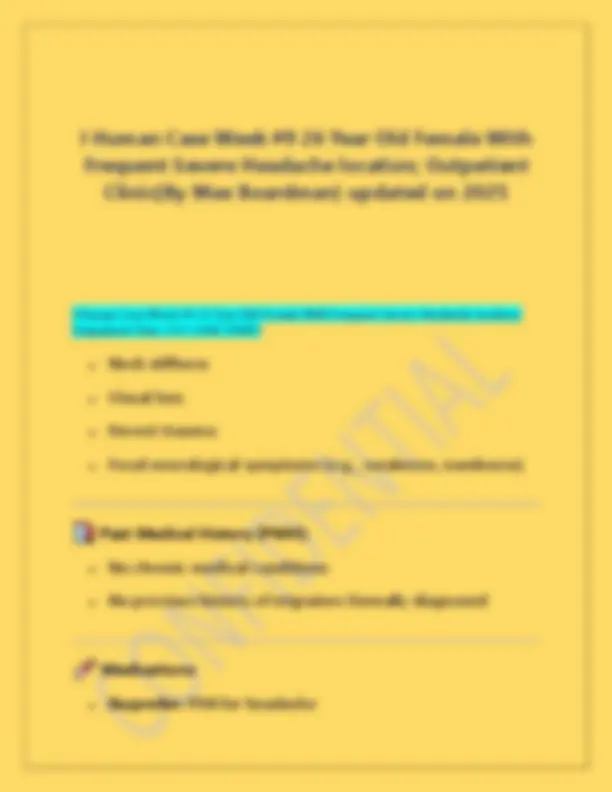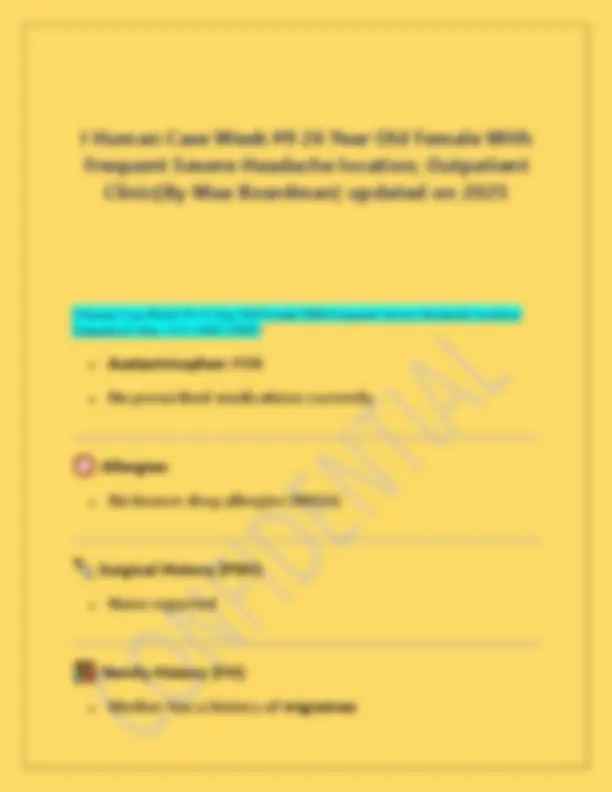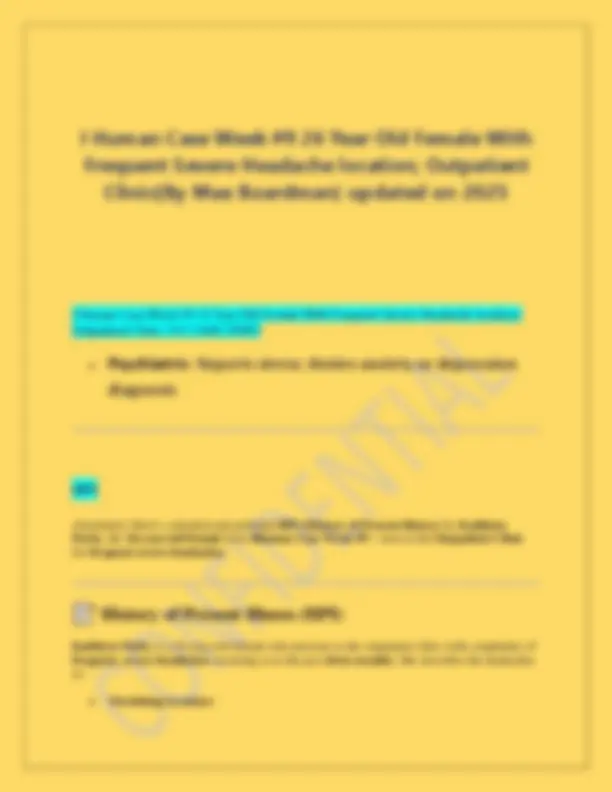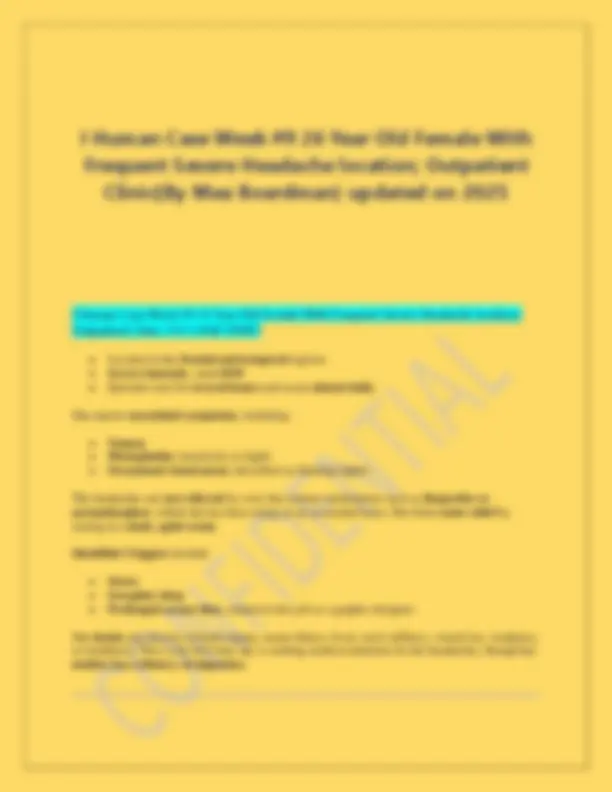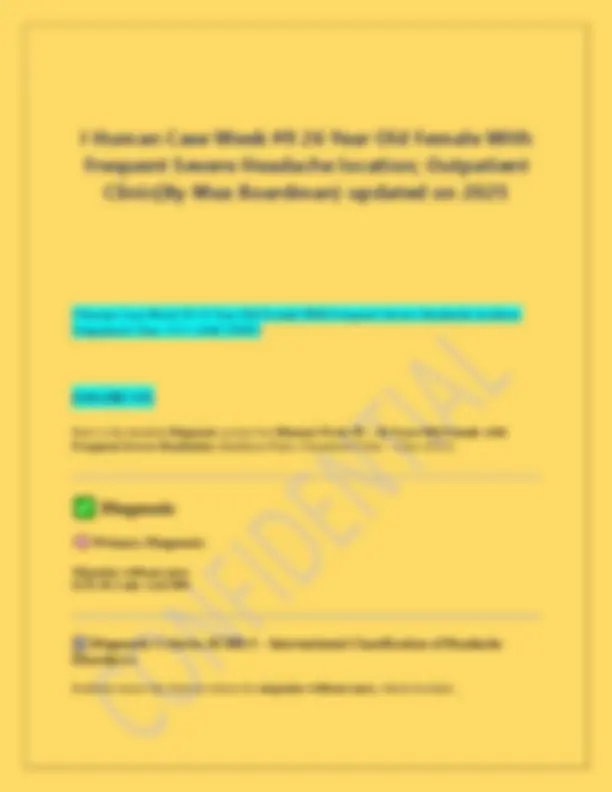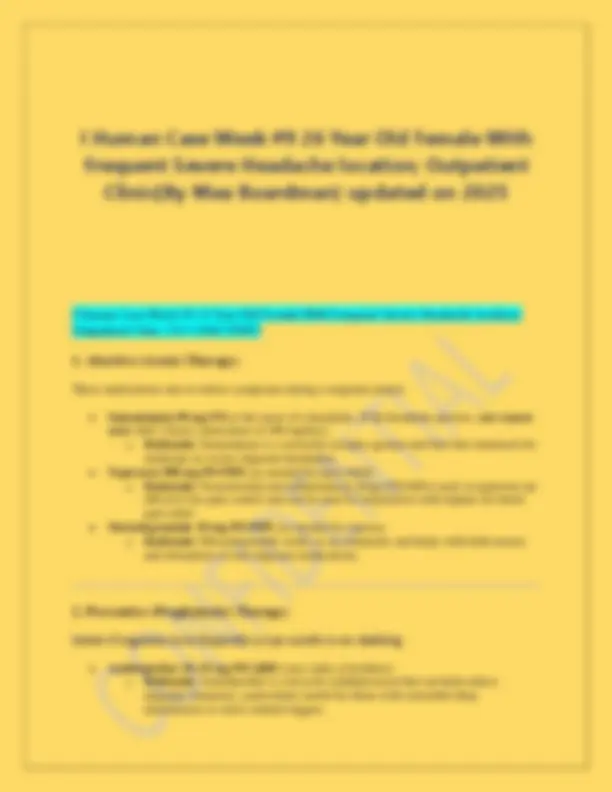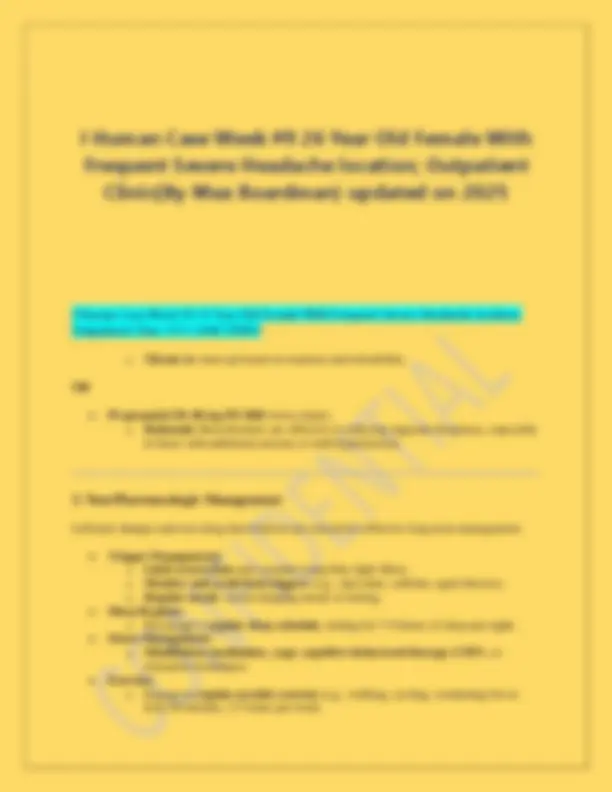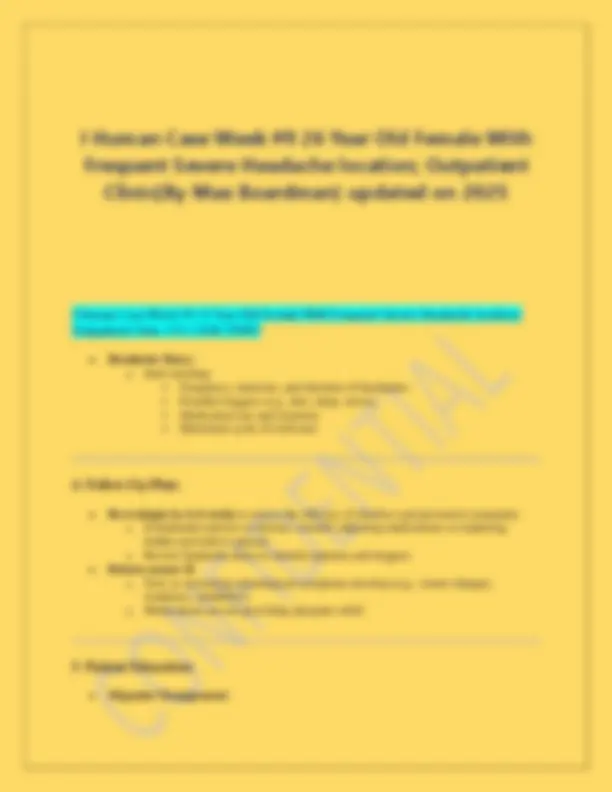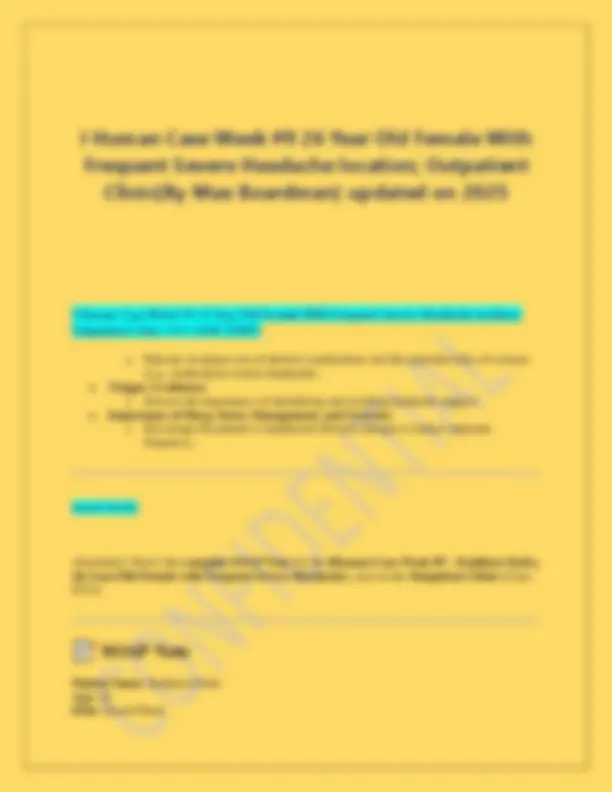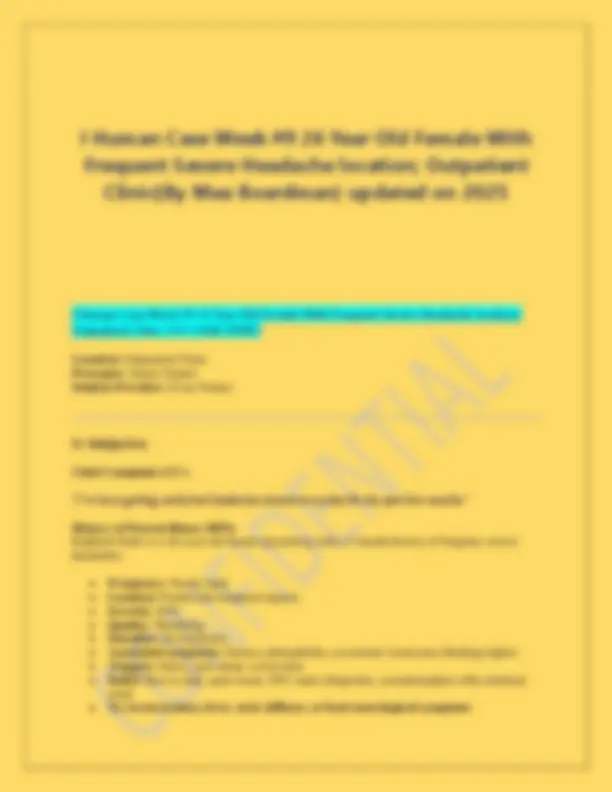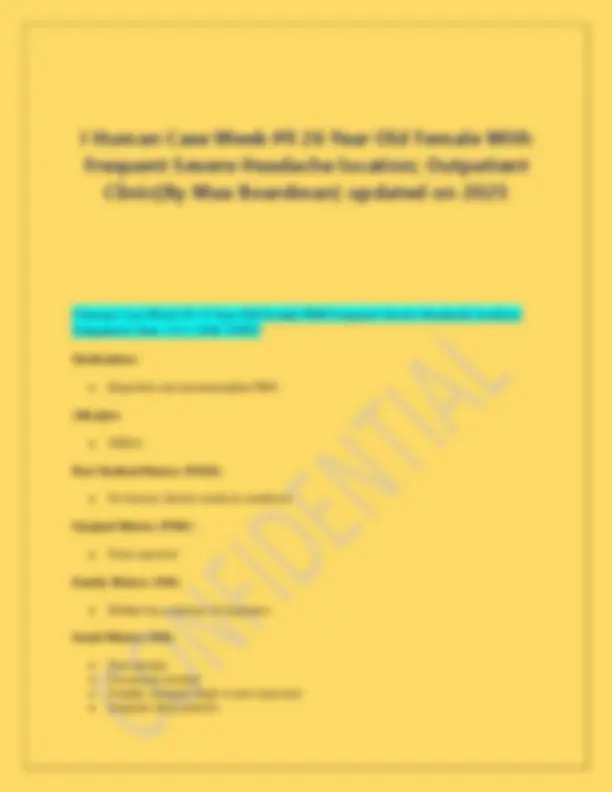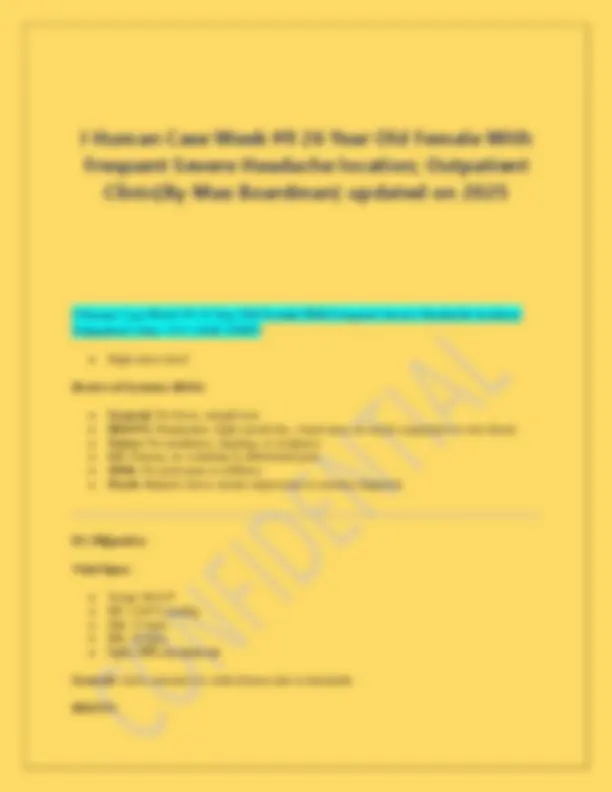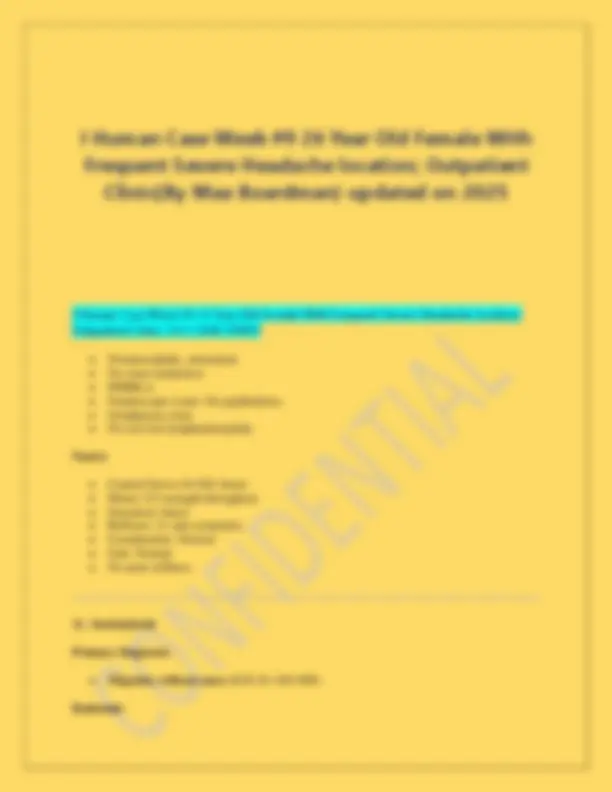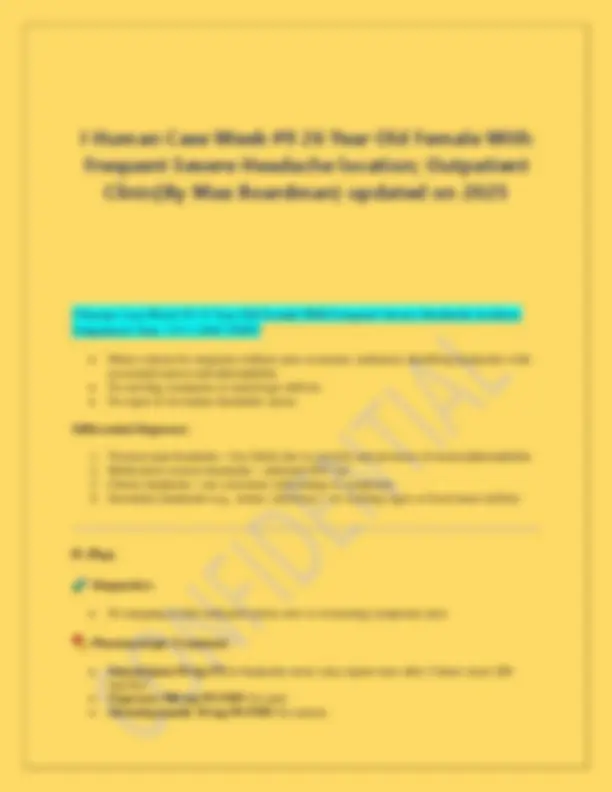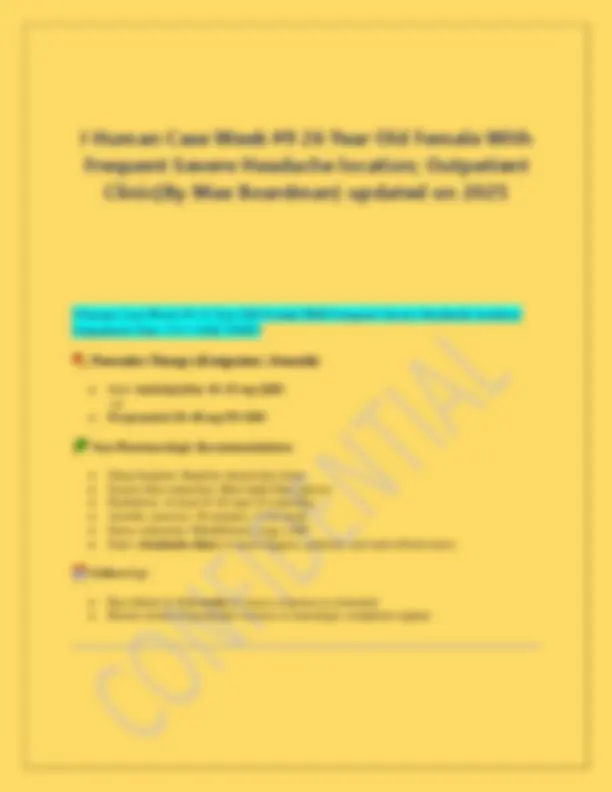Download Case Study: 26-Year-Old Female with Frequent Severe Headaches and more Exams Integrated Case Studies in PDF only on Docsity!
Frequent Severe Headache location; Outpatient
Clinic{By Max Boardman} updated on 2025
I Human Case Week #9 26 Year Old Female With Frequent Severe Headache location; Outpatient Clinic 2025 CASE STUDY
Frequent Severe Headache location; Outpatient
Clinic{By Max Boardman} updated on 2025
I Human Case Week #9 26 Year Old Female With Frequent Severe Headache location; Outpatient Clinic 2025 CASE STUDY
Frequent Severe Headache location; Outpatient
Clinic{By Max Boardman} updated on 2025
I Human Case Week #9 26 Year Old Female With Frequent Severe Headache location; Outpatient Clinic 2025 CASE STUDY
Frequent Severe Headache location; Outpatient
Clinic{By Max Boardman} updated on 2025
I Human Case Week #9 26 Year Old Female With Frequent Severe Headache location; Outpatient Clinic 2025 CASE STUDY
HISTORY
Here is the full and updated HISTORY section for the iHuman
Case Week #9 – 26 - Year-Old Female with Frequent Severe
Headaches (Kathleen Parks) in the Outpatient Clinic setting:
HISTORY
Patient Information:
• Name: Kathleen Parks
• Age: 26 years
• Sex: Female
Frequent Severe Headache location; Outpatient
Clinic{By Max Boardman} updated on 2025
I Human Case Week #9 26 Year Old Female With Frequent Severe Headache location; Outpatient Clinic 2025 CASE STUDY
Kathleen Parks is a 26-year-old female presenting with a 3-
month history of severe, frequent headaches. She describes
the pain as:
• Location: Frontal and temporal regions
• Type: Throbbing
• Severity: 8/
• Frequency: Nearly daily
• Duration: Several hours per episode
Associated symptoms:
• Nausea
• Photophobia (light sensitivity)
Frequent Severe Headache location; Outpatient
Clinic{By Max Boardman} updated on 2025
I Human Case Week #9 26 Year Old Female With Frequent Severe Headache location; Outpatient Clinic 2025 CASE STUDY
• Occasional visual aura (flashing lights)
Identified Triggers:
• Stress
• Poor sleep
• Excessive screen time
Relieving Factors:
• Rest in a dark, quiet room
• Over-the-counter meds (ibuprofen, acetaminophen)
provide minimal relief
She denies:
• Fever, chills
Frequent Severe Headache location; Outpatient
Clinic{By Max Boardman} updated on 2025
I Human Case Week #9 26 Year Old Female With Frequent Severe Headache location; Outpatient Clinic 2025 CASE STUDY
• Acetaminophen PRN
• No prescribed medications currently
Allergies:
• No known drug allergies (NKDA)
Surgical History (PSH):
• None reported
Family History (FH):
• Mother has a history of migraines
Frequent Severe Headache location; Outpatient
Clinic{By Max Boardman} updated on 2025
I Human Case Week #9 26 Year Old Female With Frequent Severe Headache location; Outpatient Clinic 2025 CASE STUDY
• No family history of seizures, stroke, or neurological
disorders
Social History (SH):
• Tobacco: Denies
• Alcohol: Occasional use
• Illicit drug use: Denies
• Occupation: Graphic designer (spends long hours at a
computer)
• Exercise: Rare
Frequent Severe Headache location; Outpatient
Clinic{By Max Boardman} updated on 2025
I Human Case Week #9 26 Year Old Female With Frequent Severe Headache location; Outpatient Clinic 2025 CASE STUDY
• Psychiatric: Reports stress; denies anxiety or depression
diagnosis
HPI
Absolutely! Here's a detailed and polished HPI (History of Present Illness) for Kathleen Parks , the 26 - year-old female from iHuman Case Week #9 – seen in the Outpatient Clinic for frequent severe headaches :
History of Present Illness (HPI)
Kathleen Parks is a 26-year-old female who presents to the outpatient clinic with complaints of frequent, severe headaches occurring over the past three months. She describes the headaches as:
Frequent Severe Headache location; Outpatient
Clinic{By Max Boardman} updated on 2025
I Human Case Week #9 26 Year Old Female With Frequent Severe Headache location; Outpatient Clinic 2025 CASE STUDY
- Located in the frontal and temporal regions
- Severe intensity , rated 8/
- Episodes last for several hours and occur almost daily She reports associated symptoms , including:
- Nausea
- Photophobia (sensitivity to light)
- Occasional visual auras (described as flashing lights) The headaches are not relieved by over-the-counter medications such as ibuprofen or acetaminophen , which she has been using on an as-needed basis. She finds some relief by resting in a dark, quiet room. Identified Triggers include:
- Stress
- Irregular sleep
- Prolonged screen time , related to her job as a graphic designer She denies any history of head trauma, recent illness, fever, neck stiffness, visual loss, weakness, or numbness. This is the first time she is seeking medical attention for her headaches, though her mother has a history of migraines.
Frequent Severe Headache location; Outpatient
Clinic{By Max Boardman} updated on 2025
I Human Case Week #9 26 Year Old Female With Frequent Severe Headache location; Outpatient Clinic 2025 CASE STUDY
- At least 5 attacks fulfilling the following: o Headache lasting 4 – 72 hours o Headache has at least 2 of the following : ▪ Unilateral location ▪ Pulsating (throbbing) quality ▪ Moderate or severe pain intensity ▪ Aggravation by routine physical activity o During the headache, at least 1 of the following : ▪ Nausea and/or vomiting ▪ Photophobia and phonophobia
Rationale:
Kathleen presents with:
- Recurrent, severe, throbbing headaches for 3 months
- Headaches are frontal/temporal , daily , lasting hours
- Associated symptoms: Nausea, photophobia, visual aura (occasionally)
- Triggers: Stress, screen exposure, lack of sleep
- Minimal relief with OTC meds
- No neurological deficits or red flags All of this strongly supports migraine without aura as the most likely diagnosis.
Frequent Severe Headache location; Outpatient
Clinic{By Max Boardman} updated on 2025
I Human Case Week #9 26 Year Old Female With Frequent Severe Headache location; Outpatient Clinic 2025 CASE STUDY
Differential Diagnoses Considered:
Differential Reason Ruled Out Tension-type headache Bilateral, non-throbbing, and mild in nature—does not match severity or nausea Medication-overuse headache No evidence of excessive analgesic use (OTC used occasionally) Cluster headache Periorbital pain, short duration, and autonomic symptoms absent Secondary headache (tumor, meningitis, sinusitis) No red flags (e.g., fever, altered mental status, neck stiffness, focal neuro signs) TREATMENT Here is the Treatment Plan for Kathleen Parks , the 26-year-old female with frequent severe headaches (Migraine without Aura) from iHuman Case Week #9 , Outpatient Clinic setting:
Treatment Plan
Frequent Severe Headache location; Outpatient
Clinic{By Max Boardman} updated on 2025
I Human Case Week #9 26 Year Old Female With Frequent Severe Headache location; Outpatient Clinic 2025 CASE STUDY o Titrate the dose up based on response and tolerability. OR
- Propranolol 20–40 mg PO BID (twice daily). o Rationale: Beta-blockers are effective in reducing migraine frequency, especially in those with additional anxiety or mild hypertension.
3. Non-Pharmacologic Management:
Lifestyle changes and non-drug interventions are crucial for effective long-term management:
- Trigger Management: o Limit screen time and consider using blue light filters. o Monitor and avoid food triggers (e.g., chocolate, caffeine, aged cheeses). o Regular meals: Avoid skipping meals or fasting.
- Sleep Hygiene: o Encourage a regular sleep schedule , aiming for 7–9 hours of sleep per night.
- Stress Management: o Mindfulness meditation , yoga , cognitive-behavioral therapy (CBT) , or relaxation techniques.
- Exercise: o Engage in regular aerobic exercise (e.g., walking, cycling, swimming) for at least 30 minutes, 3-5 times per week.
Frequent Severe Headache location; Outpatient
Clinic{By Max Boardman} updated on 2025
I Human Case Week #9 26 Year Old Female With Frequent Severe Headache location; Outpatient Clinic 2025 CASE STUDY
- Headache Diary: o Start tracking: ▪ Frequency, intensity, and duration of headaches ▪ Possible triggers (e.g., diet, sleep, stress) ▪ Medication use and response ▪ Menstrual cycle (if relevant)
4. Follow-Up Plan:
- Re-evaluate in 4–6 weeks to assess the efficacy of abortive and preventive treatment. o If headaches persist or worsen, consider adjusting medications or exploring further preventive options. o Review headache diary to identify patterns and triggers.
- Return sooner if: o New or worsening neurological symptoms develop (e.g., vision changes, weakness, numbness). o Medications are not providing adequate relief.
5. Patient Education:

